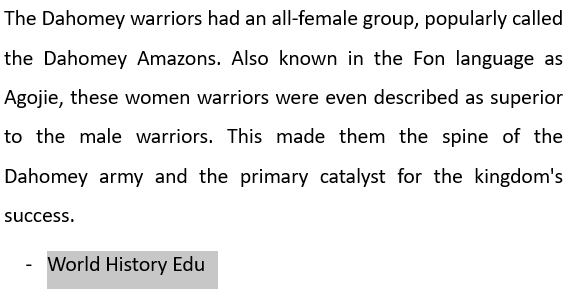
The Dahomey Amazons, also known as the Mino (our mothers), were a military unit of women who served in the army of the Kingdom of Dahomey, a West African state that existed from the early 17th century until the late 19th century. The Amazons were recruited from among the king’s wives and daughters, as well as from among the commoners, and trained in the use of weapons and tactics.
The Dahomey Amazons played a significant role in the military and political history of the region, and were feared and respected by their enemies. They fought in a number of campaigns, including the Second Franco-Dahomean War of the 1890s, in which they engaged French troops in fierce battles.
The significance of the Dahomey Amazons lies in their status as a unique example of an all-female military unit in African history. They were also remarkable for their discipline, courage, and fighting skills, which earned them a reputation as some of the fiercest warriors on the continent.
In addition to their military prowess, the Dahomey Amazons were also known for their economic and social roles in the kingdom. They served as traders, farmers, and craftspeople, and were often involved in the management of the king’s household and administration.
The legacy of the Dahomey Amazons lives on in the cultural memory of West Africa, and their story continues to inspire scholars and artists around the world. Their image has been celebrated in literature, art, and film, and they remain an important symbol of female strength and empowerment in African culture. For example, the 2022 American historical epic film “The Woman King,” directed by Gina Prince-Bythewood and written by Dana Stevens, focuses on the Dahomey Mino. The film stars Viola Davis, an American actress, as an Agojie general who is credited with instilling discipline in the all-female warrior unit.
























